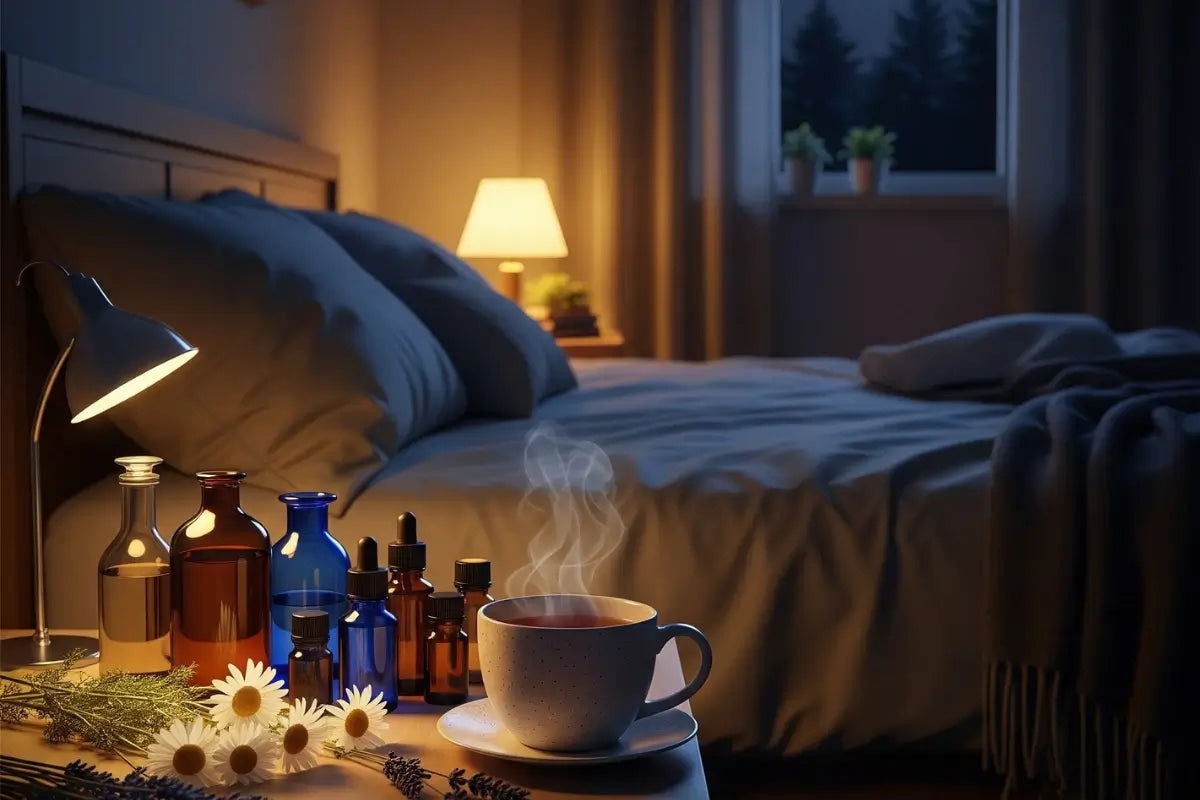Alternative Medicine for Insomnia: A Simple Guide

Struggling to fall asleep or stay asleep at night? You're not alone, and you don’t have to rely on sleeping pills.
This simple guide explores natural, effective remedies like herbs, scents, and supplements that calm your body and mind. If you want real, lasting sleep without side effects, keep reading, you might find exactly what you need.
Key Takeaways
-
Try Herbal Remedies: Valerian root, chamomile, and lavender can naturally calm your nervous system and support better sleep.
-
Use Scents to Relax: Aromatherapy with lavender or chamomile may help you fall asleep faster and wake up less often.
-
Consider Melatonin: A supplement that supports your body’s natural sleep rhythm, especially useful for jet lag or irregular schedules.
-
Ease Stress with Ashwagandha: This Ayurvedic herb can reduce anxiety and improve sleep quality over time.
-
Natural Solutions Work Best Long-Term: Many alternative remedies show real results when used consistently over several weeks.
What is Insomnia?
Insomnia is a common sleep disorder that makes it difficult to fall asleep, stay asleep, or get restful sleep, often leading to daytime fatigue, mood disturbances, and trouble concentrating.
It can be short-term, linked to stress or life changes, or chronic, lasting for months and impacting daily functioning.
Triggers may include anxiety, irregular sleep schedules, poor sleep habits, or underlying health conditions.
Researchers believe insomnia is often rooted in hyperarousal, both mental and physical, which keeps the brain in a heightened state of alertness, even during times meant for rest.
This overactivation disrupts the body's normal sleep-wake cycle, making restorative sleep elusive.

Can insomnia be cured naturally?
Yes, insomnia can often be improved or even resolved naturally. Remedies like valerian root, chamomile, lavender, melatonin, and ashwagandha help by calming the nervous system, reducing stress, and regulating sleep cycles.
Scientific studies support their effectiveness in enhancing sleep quality, shortening sleep latency, and reducing nighttime awakenings, offering safe, natural alternatives for managing and potentially curing insomnia.

Alternative medicine for insomnia
Valerian Root
Valerian root helps insomnia by gently calming the nervous system and interacting with GABA, a key brain chemical that promotes sleep, helping you fall asleep faster and experience deeper rest.
According to American Family Physician, valerian taken nightly for 1–2 weeks significantly improved sleep quality in self-described poor sleepers. Once again, science proves valerian’s natural power.

Chamomile
Chamomile helps insomnia by calming the nervous system and promoting relaxation, which can make it easier to fall and stay asleep.
Its mild sedative effects are believed to come from the antioxidant apigenin, which binds to certain brain receptors that influence sleep.
One study found that inhaling chamomile oil for 15 days significantly improved sleep quality and reduced insomnia severity in young adults.
Another clinical trial showed that taking chamomile extract twice daily offered modest improvements in nighttime awakenings and daytime fatigue. Together, these findings support chamomile as a gentle, natural aid for better sleep.
Lavender
Lavender helps improve sleep by calming the nervous system, reducing heart rate, and promoting relaxation through its soothing aroma, which can make it easier to fall and stay asleep.
In one randomized controlled trial, college students who wore a lavender-infused patch while practicing good sleep hygiene reported better sleep quality and woke feeling more refreshed than those using hygiene alone.
Similarly, a study in Iran found that elderly people exposed to lavender aromatherapy for a week had significantly improved sleep quality, including falling asleep faster and experiencing fewer disturbances.
Melatonin
Melatonin helps regulate your body’s internal clock, making it easier to fall asleep and stay asleep.
It works by mimicking the natural rise of melatonin your brain releases at night, signaling that it’s time to rest.
This can be especially helpful if your sleep schedule is off, like from stress or travel. A meta-analysisof 19 studies showed that melatonin significantly reduced the time it takes to fall asleep and increased total sleep time.
Another high-quality review of 35 trials supported melatonin’s benefit in improving sleep quality, especially for people with insomnia or jet lag.
Ashwagandha
Struggling to fall asleep at night? Ashwagandha might help calm your mind and reset your sleep cycle.
This ancient Ayurvedic herb works by balancing stress hormones like cortisol and supporting the body’s natural sleep-wake rhythm.
In one 10-week clinical trial, people taking 600 mg of Ashwagandha daily fell asleep faster and reported better sleep quality than those on a placebo.
Another analysis of five trials found that Ashwagandha noticeably improved sleep, especially in people with insomnia, without any serious side effects. It's a natural way to get the rest you need.




